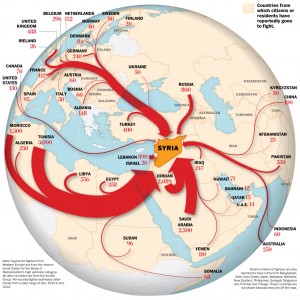As the Islamic State continues its armed campaign in Iraq and Syria, its ideology is drawing fans and fighters from as far as Southern Asia and China. While the attack in Australia drew the world attention to the threat from 'lone wolf' attacks by ISIS volunteers returning home, elsewhere in Asia insurgency is more organized - four new terrorist organizations are already aiming to establish an Islamic Caliphate in the Far East region called Daulah Islamiah Nusantara that is to comprise Malaysia, Indonesia, Singapore, southern Thailand and southern Philippines.

However, Iraqi military sources claim to have caught a Chinese citizen fighting for the Islamic State militant group. China’s Muslim population is known predominantly in the western regions of the country, which is often marginalized by the officially atheist Chinese government. Yin Gang, a West Asian and African Studies scholar at the Chinese Academy of Social Sciences, reported in a western news media that hundreds of Chinese nationals are currently fighting for the Islamic State, citing previous examples of Chinese citizens joining al-Qaeda in Afghanistan.


In May 2014, a group of jihadists from the Philippines declared support for the ISIS. In August, it released a video in which the jihadists, who belonged to Jama’at Ansar Al-Khilafa (JAK), formally swore fealty to Abu Bakr Al-Baghdadi. The video, in which the faces of the jihadists were blurred, was produced by the jihadi media outlet Al-Battar.
In August 2014, it emerged that scores of Filipino jihadists have joined the Islamic State in Iraq. Fidel Ramos, the former president of the Philippines, told a newspaper: “At least a hundred of our young Filipino-Muslims have infiltrated Iraq where they get training and they can launch jihad when they come back to the Philippines.”
Malaysian authorities recently stopped a major ISIS-influenced attack, and Indonesian and Philippine officials are scrambling to prevent their own growing flocks of Islamic inspired terrorists from going on the rampage. The Philippines’ Foreign Ministry says that 200 of its citizens have gone to war under ISIS’s flag in the Middle East. Most of these are orphans of dead fighters from domestic Islamist insurgent groups such as the Abu Sayyaf Group (ASG) and Moro National Liberation Front.
Indonesia, long troubled by radicals that have fought for a caliphate for decades, recently banned its citizens from joining ISIS. Jailed terrorist kingpin Abu Bakar Ba’asyir, the radical Indonesian cleric who heads Jemmah Anshorut Tauhid (JAT) was already causing the authorities considerable headache. His activities are gaining power with ISIS cells encouraging young Muslim recruits to join its ranks. Last August, Indonesia’s police counter terror unit, Detachment 88, arrested JAT official Afif Abdul Majid and two others for joining ISIS. Malaysian Special Branch (SB) arrested several ISIS suspects, planning to carry out terrorist attacks in the country. Security sources claimed that at least 20 of its citizens — and probably more — have joined ISIS fighting in the Middle East, and at least three have been killed.
The plan for a regional Islamic caliphate – Daulah Islamiah Nusantara – was also confirmed in August by Ayob Khan Mydin Pitchay, the Malaysian counter-terrorism official whose investigations led to the arrest of the 19 jihadists in Malaysia. Ayob Khan confirmed that the militants “had visions of establishing a hardline Southeast Asian caliphate spanning Malaysia, Indonesia, Thailand, the Philippines and Singapore, and planned to travel to Syria” to learn from the Islamic State.
ISIS is currently the greatest actual security threat China faces in the world. Chinese Muslim Uighur separatists who have been have been joining ISIS in Iraq and Syria. Eventually (if not already) these battle-hardened Uighur separatists will begin to make their way back into China and begin a campaign of terrorism on a scale previously unimaginable in China.
The Muslim Uighurs are part of the population of the Xinjiang region in Western China. Many Uighurs have joined ISIS in Iraq and Syria, where they are trained in terrorism and combat. These terrorists are building a valuable network of different Muslim extremist groups who can supply them with weapons, as well as logistical and ideological support.
So far the effectiveness of Uighur attacks in China have been limited because the separatist groups are largely unorganized and fractured. But as ISIS-trained Uighur extremists begin to trickle back into China, the Chinese government will find itself battling an entirely different.
Once this happens, the world can expect to see a China that is much more willing to involve itself in military intervention creating a historic precedent for China in international disputes. This willingness to use force will have profound implications on China’s ongoing territorial disputes with surrounding Asian nations, in which Pyongyang has already been flexing its military might in this context. Should the influence of ISIS escalate into an organized terror threat inside China, one can expect a new military superpower, as China expands its military capabilities.
http://defense-update.com/20150102_isis_in_the_far-east.html#.VKoozZVgNjp

No comments:
Post a Comment
Note: Only a member of this blog may post a comment.